By Brandon Griggs, CNN
Updated 7:55 PM ET, Thu June 25, 2020
Chat with us in Facebook Messenger. Find out what's happening in the world as it unfolds.
(CNN)From Motown and "The Cosby Show" to hip-hop and "Black Panther," America has long consumed Black culture -- even as our country's systemic racism sent a very different message.
But never quite like this.
In the weeks since the recent Black Lives Matter protests, Black-themed cultural media have been having a moment.
Books, music, movies, TV series and podcasts that explore issues of racism and the Black experience are topping charts and being newly showcased on streaming services. Black artists, inspired by what feels like a social movement, are releasing new music and videos that address issues of social justice or celebrate Blackness.
Meanwhile, artworks seen as racially insensitive -- or just downright racist -- are being banished. And white entertainers are apologizing for appearing in blackface.
Pop culture has always been quick to reflect shifting public moods. And Americans have grappled with cultural works about race and brutality since before Billie Holiday's "Strange Fruit."
But Black scholars say there's been a sense in recent weeks that Americans' attitudes on race and culture are changing for real this time -- and that entertainers who ignore them do so at their peril.
"It is a long-overdue reckoning," says Karsonya Wise Whitehead, a documentary filmmaker who teaches African American Studies at Loyola University Maryland. "This is a moment to do a radical reshaping of how we are seen."
In several ways, it's already happening.
There's renewed interest in Black-themed art and entertainment
Books about race have been topping the bestseller lists: This includes both fiction and nonfiction. At one point earlier this month, 15 of the top 20 bestselling books on Amazon were about race, racism and White supremacy in the US.
Demand for titles that help White people understand racism has spiked: Books such as Ibram X. Kendi's "How to be an Antiracist" and Robin Diangelo's "White Fragility: Why It's So Hard for White People to Talk About Racism" have sometimes been out of stock.

"We have been writing, singing and rapping about these societal ills for years," says Whitehead, the Loyola professor. "This is not new. It's just being finally noticed by the White community."
Streaming platforms have been prominently featuring Black-themed content: Netflix has been promoting a new "Black Lives Matter" collection to customers in the US, featuring dozens of movies and series about racial injustice and the lives of Black Americans. Among them are Ava DuVernay's documentary "13th," about racism in the criminal justice system, and Spike Lee's new drama "Da 5 Bloods," about Black soldiers returning to Vietnam to find the remains of their fallen squad leader.

Interest in these and other Black-themed content has spiked. Demand for the Netflix series "Dear White People" has surged more than 446% over the past 30 days, according to Parrot Analytics, which measures the popularity of TV programming. "When They See Us," DuVernay's 2019 miniseries about the wrongly convicted Central Park 5, also got a sizable bump.
"New audiences appear to be turning to these stories as a form of education and understanding of the Black experience in America," says Ashley Alleyne-Morris an insights director at Parrot Analytics.
Audiences are turning to podcasts about race: In the world of podcasts, Apple's charts show audiences are gravitating toward the New York Times' "1619," about the history of slavery in America, and NPR's Code Switch, which features journalists of color talking about race.

Audiences seeking to channel their anger over police brutality and other issues raised by the George Floyd protests are seeking out non-Black content as well. Streams of music by rock band Rage Against the Machine, known for their revolutionary political views, have surged over the past month.
It's tempting to suggest that the newfound popularity of all this woke content will lead to meaningful social change. But Vincent Stephens, director of the Popel Shaw Center for Race & Ethnicity at Dickinson College, urges caution.
"We must be careful to not mistake sales for social reform," he says. "Translating the knowledge and content from books and electronic media into everyday antiracist practices is the only meaningful way for this renewed attention to influence society."
People are reappraising racist or inappropriate cultural content
Hollywood has had an uneasy relationship with race dating back to "The Birth of a Nation," the landmark 1915 silent film that glorified the Ku Klux Klan.
Problematic content is being pulled: "Gone With the Wind," one of the most popular movies ever made, has long been criticized for its mythical depictions of slavery but remained a TV staple until this month, when HBO Max pulled the 1939 film from its slate of offerings.

On Wednesday the streaming service -- owned by WarnerMedia, CNN's parent company -- brought back the movie but with two additional videos that discuss its historical context.
Disney has taken a similar approach to the original animated "Dumbo," which features a character named Jim Crow, voiced by a Caucasian actor using a stereotypical African-American accent. On the Disney+ streaming service, "Dumbo" is presented with a disclaimer saying the movie "may contain outdated cultural depictions."
Kevin Willmott, a professor of film and media studies at the University of Kansas who won an Oscar for co-writing "BlacKkKlansman" with Spike Lee, says films like "Gone With the Wind" should come with warning labels that place them in historical context and educate viewers about racism.
"The more you know about our racist history, the more you understand what's going on now," he says. "We're in this pop culture moment right now. America is struggling about what kind of country it wants to be."
But Wes Jackson, an educator at Emerson College and co-founder of the Brooklyn Hip-Hop Festival, has no patience for dated cultural works with racist caricatures.

"Get 'Dumbo' off Disney Plus. I don't want to see any more 'Little Rascals,'" he says. "A teachable moment? You've been able to teach this moment for 500 years, and you haven't," he says. "So I want it gone. It's insulting to me."
Stars are apologizing for their past use of blackface: This week Tina Fey, creator and star of the Emmy-winning series "30 Rock," asked streaming services to remove four of the show's episodes that feature White actors in blackface. Fey apologized for the episodes and the "pain they have caused."
Talk show host Jimmy Kimmel and radio personality Howard Stern have also recently addressed wearing blackface during past TV sketches.
People are viewing long-established acts and shows through a new lens: Reality shows about police officers, including "Live PD" and "Cops," have been canceled over criticisms that they glorified police violence.

Whitehead, the Loyola professor, says she's been revisiting shows like "Seinfeld" and "Friends," which featured no major characters of color, with more critical eyes.
"You look at this and think, 'Where are the Black characters on this show?'" she says. "How has this been OK?"
This revisionist thinking has even extended to the names of musical acts. Country music trios Lady Antebellum and the Dixie Chicks both changed their names this month.
Yes, things are changing. But will it last?
That depends on who you ask. But cultural observers are cautiously optimistic.
Asked why pop culture seems to be becoming more racially enlightened in recent weeks, Wes Jackson has a simple answer: money.
The Emerson College professor says business executives looked at the sheer breadth and diversity of the George Floyd protesters and realized there was money to be made.
"Someone pulled out a spreadsheet and said, 'We better get on the other side of this,'" he says.

As educators, Jackson and Willmott, the Kansas professor, both say they have another reason to be hopeful: their White students, who appreciate Black culture and don't tolerate racism in their entertainment.
"These are White kids coming in here, progressive and engaged," Jackson says. "These are people who grew up on Obama and Beyoncé and Jay-Z. They're like, 'Yeah, of course Black lives matter -- when did they not?'"
Some scholars say they sense a seismic cultural shift regarding pop-culture portrayals of people of color. But others caution it's too soon to say whether this is more than just a fleeting moment of media wokeness.
"We have to be very careful about saying that one moment clearly represents a totally new shift in media," says Rebecca Wanzo, an associate professor at Washington University in St. Louis who studies African-American literature and culture.
Wanzo sees the present moment as just one in a series of historical moments in which activism has spurred people to examine African-American art and literature that addresses oppression.

"There has never been a moment, nor can I imagine there will ever be ... when everyone in the country 'wakes up' to racism," she adds. "The war against antiblackness has lasted for centuries, and it is a slow chipping away."
"The movement is potentially exciting, but the jury is still out on substantive change," says Bridgette Baldwin, a professor of law at Western New England University who has studied the intersection of race and social justice. "Some of the change is being fueled by brand management in the desire to appear political yet remain safe," she adds.
"Right now, cultural critics and Black figures are en vogue. Everyone wants to get the Black perspective and carry a 'Black Lives Matter' sign. But we will see if people are still listening when the buildings stop burning."
Some observers say that real, lasting change in terms of race and representation in pop culture will only happen when the entertainment industry hires more people of color as writers, producers, directors and showrunners.
As if to drive home that point, more than 300 Black actors, artists and executives, including Issa Rae, Michael B. Jordan and Viola Davis, signed an open letter Tuesday urging Hollywood to "prove Black Lives Matter" by no longer telling stories that glorify police brutality and by investing in anti-racist content and the careers of Black creative figures.
"Due to Hollywood's immense influence over politics and culture, all of the racism, discrimination and glass ceilings Black people in Hollywood experience on a regular basis have direct implications on Black lives everywhere," it says.
"...this gives us less control over our narratives (and) continues the legacy of white supremacy's influence over our stories."
The reckoning is here.

 5 years ago
1470
5 years ago
1470 

